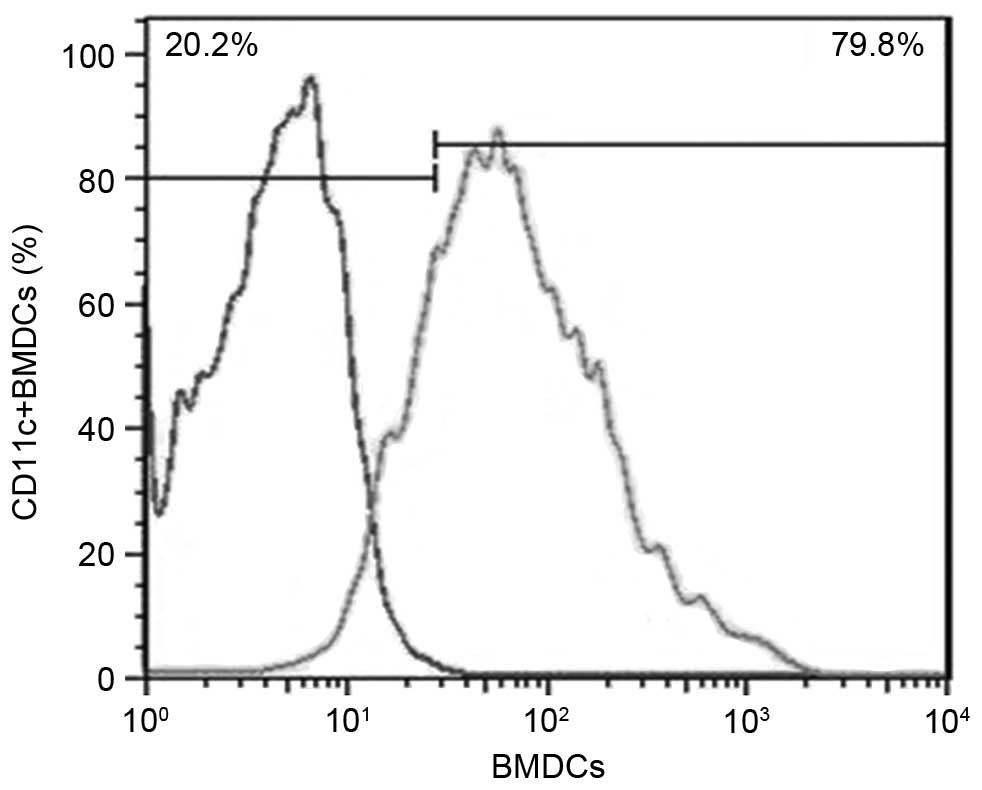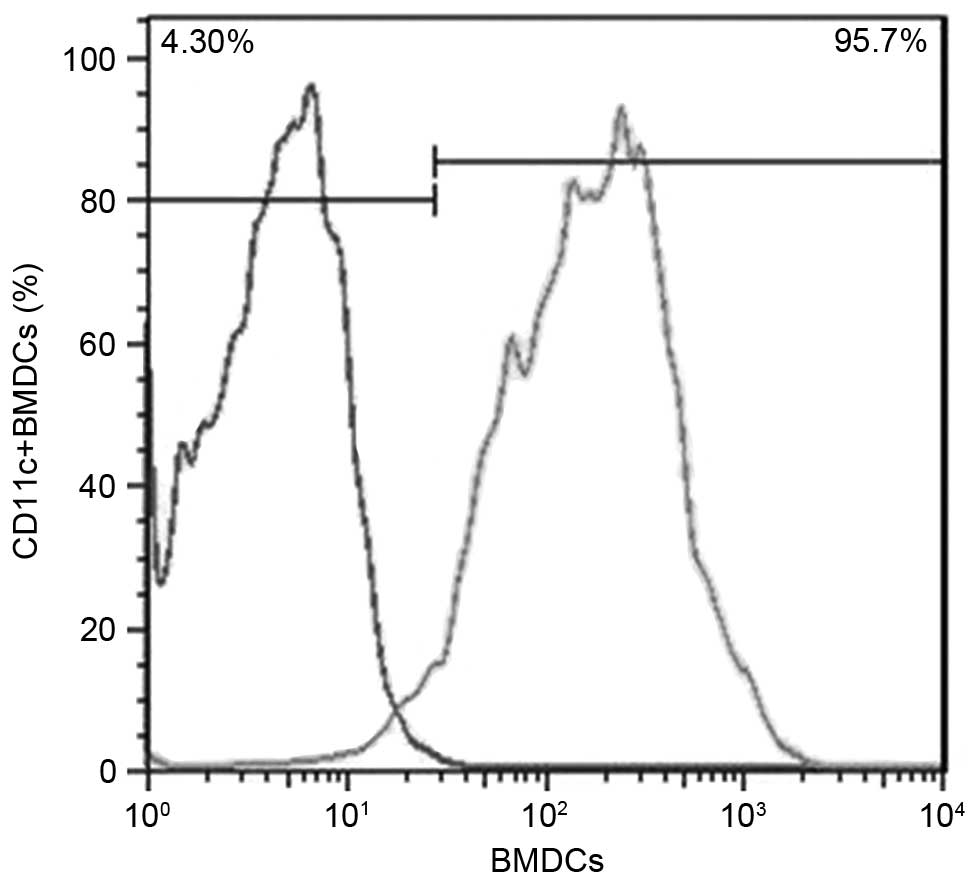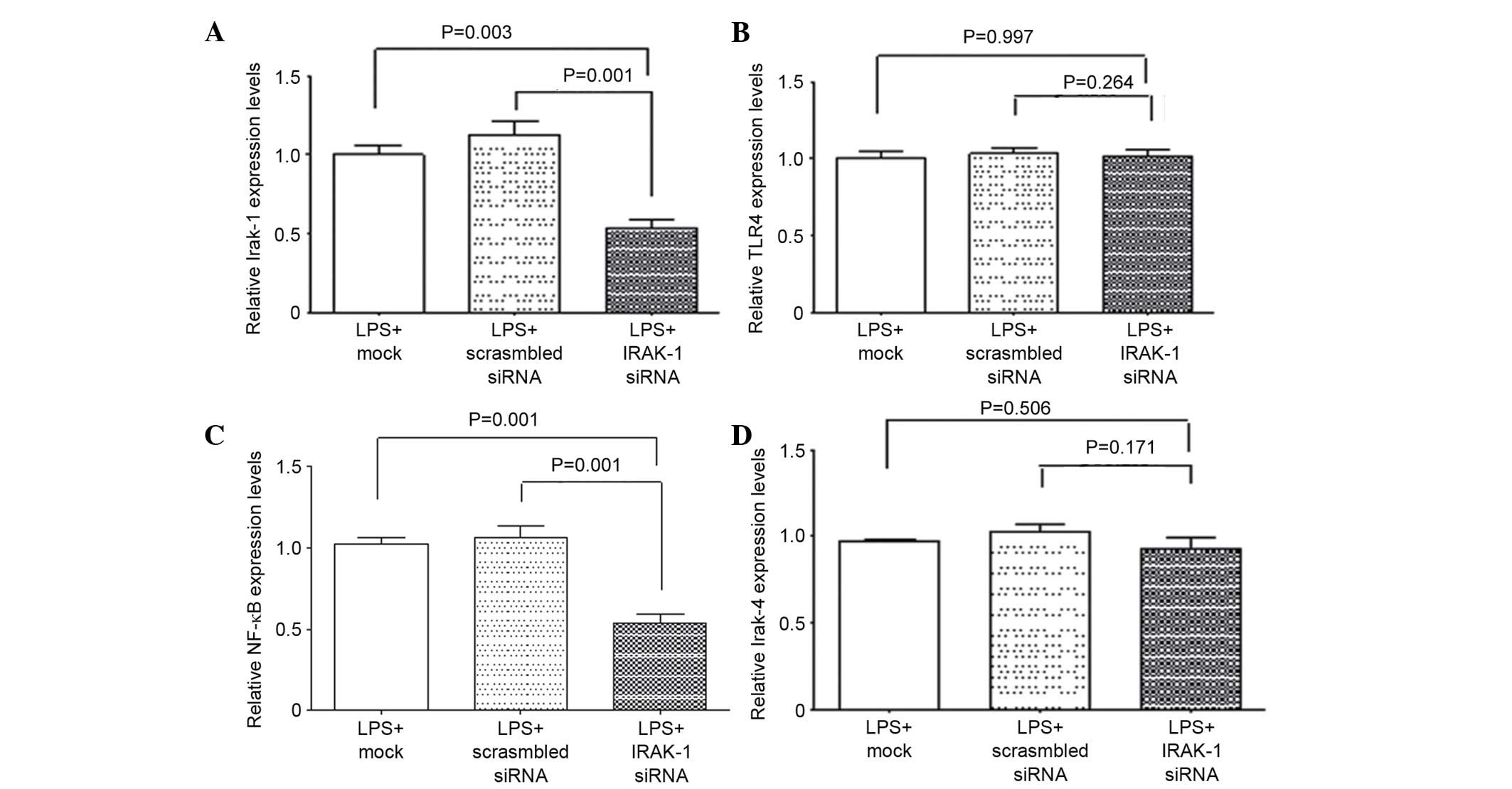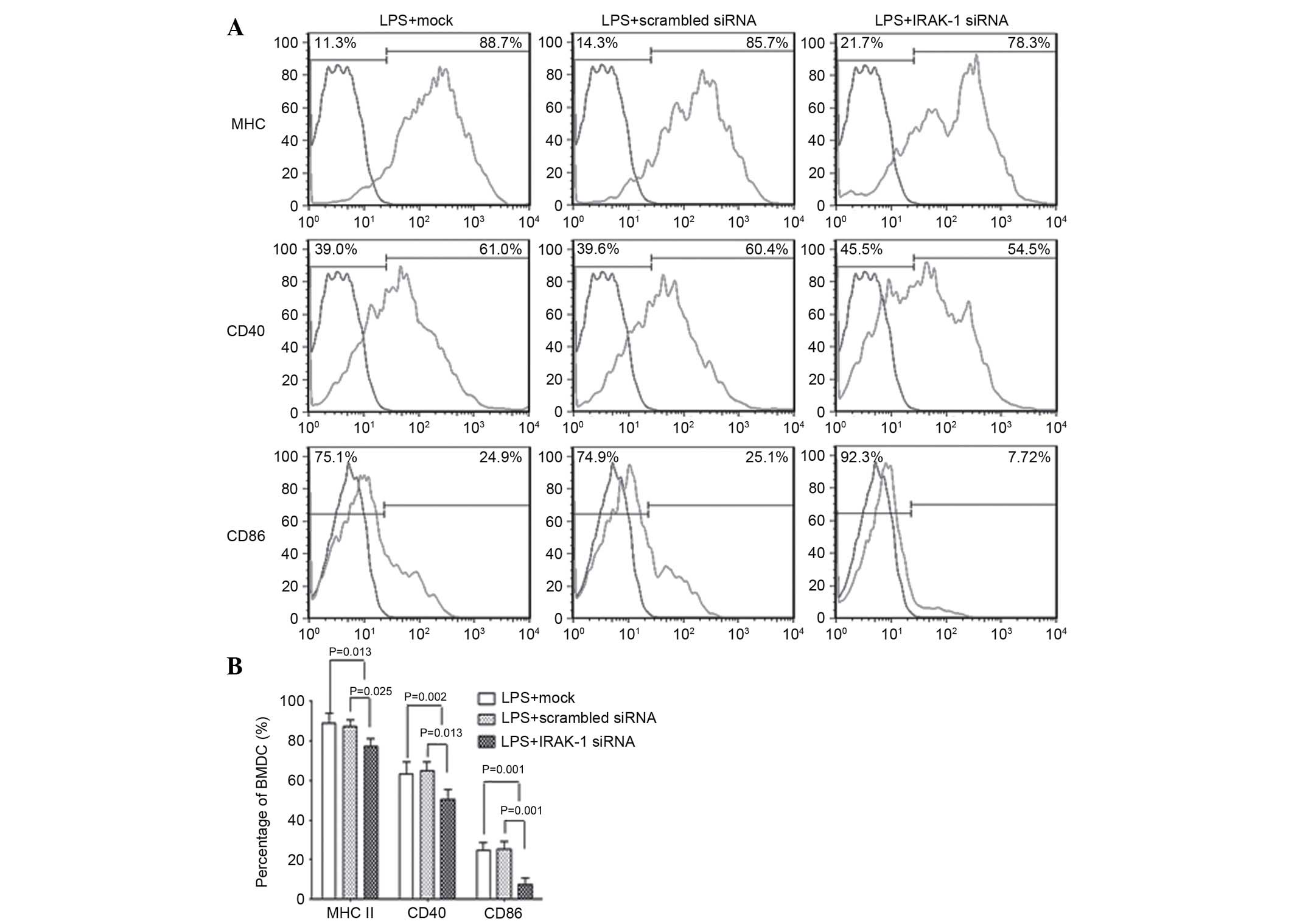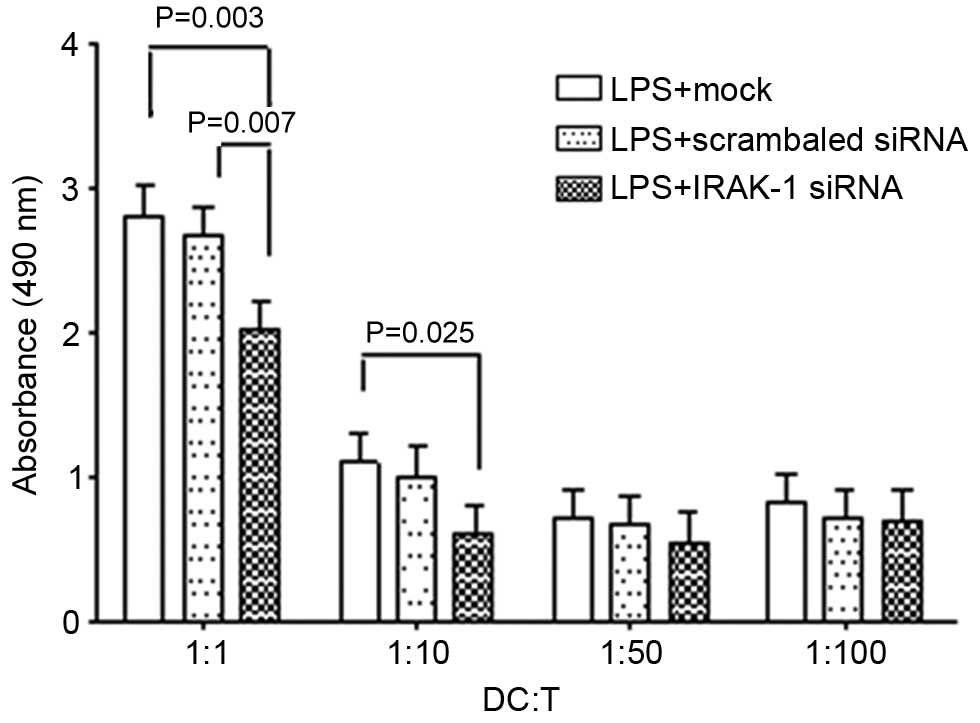|
1
|
Kumar H, Kawai T and Akira S: Pathogen
recognition by the innate immune system. Int Rev Immunol. 30:16–34.
2011. View Article : Google Scholar : PubMed/NCBI
|
|
2
|
Fischer M and Ehlers M: Toll-like
receptors in autoimmunity. Ann N Y Acad Sci. 1143:21–34. 2008.
View Article : Google Scholar : PubMed/NCBI
|
|
3
|
Brown J, Wang H, Hajishengallis GN and
Martin M: TLR-signaling networks: An integration of adaptor
molecules, kinases and cross-talk. J Dent Res. 90:417–427. 2011.
View Article : Google Scholar : PubMed/NCBI
|
|
4
|
Satpathy AT, Wu X, Albring JC and Murphy
KM: Re(de)fining the dendritic cell lineage. Nat Immunol.
13:1145–1154. 2012. View
Article : Google Scholar : PubMed/NCBI
|
|
5
|
Pearce EJ and Everts B: Dendritic cell
metabolism. Nat Rev Immunol. 15:18–29. 2015. View Article : Google Scholar : PubMed/NCBI
|
|
6
|
Xiong Y, Qiu F, Piao W, Song C, Wahl LM
and Medvedev AE: Endotoxin tolerance impairs IL-1
receptor-associated kinase (IRAK) 4 and TGF-beta-activated kinase 1
activation, K63-linked polyubiquitination and assembly of IRAK1,
TNF receptor-associated factor 6 and IkappaB kinase gamma and
increases A20 expression. J Biol Chem. 286:7905–7916. 2011.
View Article : Google Scholar : PubMed/NCBI
|
|
7
|
Cohen P: The TLR and IL-1 signalling
network at a glance. J Cell Sci. 127:2383–2390. 2014. View Article : Google Scholar : PubMed/NCBI
|
|
8
|
Mihret A, Mamo G, Tafesse M, Hailu A and
Parida S: Dendritic Cells activate and mature after infection with
mycobacterium tuberculosis. BMC Res Notes. 4:2472011. View Article : Google Scholar : PubMed/NCBI
|
|
9
|
Zanoni I, Ostuni R, Capuano G, Collini M,
Caccia M, Ronchi AE, Rocchetti M, Mingozzi F, Foti M, Chirico G, et
al: CD14 regulates the dendritic cell life cycle after LPS exposure
through NFAT activation. Nature. 460:264–268. 2009. View Article : Google Scholar : PubMed/NCBI
|
|
10
|
Livak KJ and Schmittgen TD: Analysis of
relative gene expression data using real-time quantitative PCR and
the 2(−Delta Delta C(T)) Method. Methods. 25:402–408. 2001.
View Article : Google Scholar : PubMed/NCBI
|
|
11
|
Thomas JA, Allen JL, Tsen M, Dubnicoff T,
Danao J, Liao XC, Cao Z and Wasserman SA: Impaired cytokine
signaling in mice lacking the IL-1 receptor-associated kinase. J
Immunol. 163:978–984. 1999.PubMed/NCBI
|
|
12
|
Suzuki N, Suzuki S, Duncan GS, Millar DG,
Wada T, Mirtsos C, Takada H, Wakeham A, Itie A, Li S, et al: Severe
impairment of interleukin-1 and Toll-like receptor signalling in
mice lacking IRAK-4. Nature. 416:750–756. 2002. View Article : Google Scholar : PubMed/NCBI
|
|
13
|
Kim TW, Staschke K, Bulek K, Yao J, Peters
K, Oh KH, Vandenburg Y, Xiao H, Qian W, Hamilton T, et al: A
critical role for IRAK4 kinase activity in Toll-like
receptor-mediated innate immunity. J Exp Med. 204:1025–1036. 2007.
View Article : Google Scholar : PubMed/NCBI
|
|
14
|
Beinke S, Robinson MJ, Hugunin M and Ley
SC: Lipopolysaccharide activation of the TPL-2/MEK/extracellular
signal-regulated kinase mitogen-activated protein kinase cascade is
regulated by I kappa B kinase-induced proteolysis of NF-kappa B1
p105. Mol Cell Biol. 24:9658–9667. 2004. View Article : Google Scholar : PubMed/NCBI
|
|
15
|
Swantek JL, Tsen MF, Cobb MH and Thomas
JA: IL-1 receptor-associated kinase modulates host responsiveness
to endotoxin. J Immunol. 164:4301–4306. 2000. View Article : Google Scholar : PubMed/NCBI
|
|
16
|
Deng C, Radu C, Diab A, Tsen MF, Hussain
R, Cowdery JS, Racke MK and Thomas JA: IL-1 receptor-associated
kinase 1 regulates susceptibility to organ-specific autoimmunity. J
Immunol. 170:2833–2842. 2003. View Article : Google Scholar : PubMed/NCBI
|
|
17
|
Uematsu S, Sato S, Yamamoto M, Hirotani T,
Kato H, Takeshita F, Matsuda M, Coban C, Ishii KJ, Kawai T, et al:
Interleukin-1 receptor-associated kinase-1 plays an essential role
for Toll-like receptor (TLR)7- and TLR9-mediated interferon-alpha
induction. J Exp Med. 201:915–923. 2005. View Article : Google Scholar : PubMed/NCBI
|
|
18
|
Ahmad R, Sylvester J and Zafarullah M:
MyD88, IRAK1 and TRAF6 knockdown in human chondrocytes inhibits
interleukin-1-induced matrix metalloproteinase-13 gene expression
and promoter activity by impairing MAP kinase activation. Cell
Signal. 19:2549–2557. 2007. View Article : Google Scholar : PubMed/NCBI
|
|
19
|
Reynolds JM, Martinez GJ, Chung Y and Dong
C: Toll-like receptor 4 signaling in T cells promotes autoimmune
inflammation. Proc Natl Acad Sci USA. 109:13064–13069. 2012.
View Article : Google Scholar : PubMed/NCBI
|
|
20
|
Schiffenbauer J, Streit WJ, Butfiloski E,
LaBow M, Edwards C III and Moldawer LL: The induction of EAE is
only partially dependent on TNF receptor signaling but requires the
IL-1 type I receptor. Clin Immunol. 95:117–123. 2000. View Article : Google Scholar : PubMed/NCBI
|
|
21
|
Shi FD, Takeda K, Akira S, Sarvetnick N
and Ljunggren HG: IL-18 directs autoreactive T cells and promotes
autodestruction in the central nervous system via induction of
IFN-gamma by NK cells. J Immunol. 165:3099–3104. 2000. View Article : Google Scholar : PubMed/NCBI
|
|
22
|
Doyle SL and O'Neill LA: Toll-like
receptors: From the discovery of NFKB to new insights into
transcriptional regulations in innate immunity. Biochem Pharmacol.
72:1102–1113. 2006. View Article : Google Scholar : PubMed/NCBI
|
|
23
|
Maitra U, Davis S, Reilly CM and Li L:
Differential regulation of Foxp3 and IL-17 expression in CD4 T
helper cells by IRAK-1. J Immunol. 182:5763–5769. 2009. View Article : Google Scholar : PubMed/NCBI
|
|
24
|
Galicia G and Gommerman JL: Plasmacytoid
dendritic cells and autoimmune inflammation. Biol Chem.
395:335–346. 2014. View Article : Google Scholar : PubMed/NCBI
|
|
25
|
Mellanby RJ, Cambrook H, Turner DG,
O'Connor RA, Leech MD, Kurschus FC, MacDonald AS, Arnold B and
Anderton SM: TLR-4 ligation of dendritic cells is sufficient to
drive pathogenic T cell function in experimental autoimmune
encephalomyelitis. J Neuroinflammation. 9:2482012. View Article : Google Scholar : PubMed/NCBI
|
|
26
|
Zhang S, Yang N, Ni S, Li W, Xu L, Dong P
and Lu M: Pretreatment of lipopolysaccharide (LPS) ameliorates
D-GalN/LPS induced acute liver failure through TLR4 signaling
pathway. Int J Clin Exp Pathol. 7:6626–6634. 2015.
|
|
27
|
Read MA, Cordle SR, Veach RA, Carlisle CD
and Hawiger J: Cell-free pool of CD14 mediates activation of
transcription factor NF-kappa B by lipopolysaccharide in human
endothelial cells. Proc Natl Acad Sci U S A. 90:9887–9891. 1993.
View Article : Google Scholar : PubMed/NCBI
|
|
28
|
Tian G, Li JL, Wang DG and Zhou D:
Targeting IL-10 in auto-immune diseases. Cell Biochem Biophys.
70:37–49. 2014. View Article : Google Scholar : PubMed/NCBI
|
|
29
|
Hesse D, Krakauer M, Lund H, Søndergaard
HB, Limborg SJ, Sørensen PS and Sellebjerg F: Disease protection
and interleukin-10 induction by endogenous interferon-beta in
multiple sclerosis? Eur J Neurol. 18:266–272. 2011. View Article : Google Scholar : PubMed/NCBI
|
|
30
|
Correa F, Hernangómez-Herrero M, Mestre L,
Loría F, Docagne F and Guaza C: The endocannabinoid anandamide
downregulates IL-23 and IL-12 subunits in a viral model of multiple
sclerosis: Evidence for a cross-talk between IL-12p70/IL-23 axis
and IL-10 in microglial cells. Brain Behav Immun. 25:736–749. 2011.
View Article : Google Scholar : PubMed/NCBI
|
|
31
|
O'Garra A and Murphy KM: From IL-10 to
IL-12: How pathogens and their products stimulate APCs to induce T
(H)1 development. Nature Immunol. 10:929–932. 2009. View Article : Google Scholar
|
|
32
|
Chaudhry A, Samstein RM, Treuting P, Liang
Y, Pils MC, Heinrich JM, Jack RS, Wunderlich FT, Brüning JC, Müller
W and Rudensky AY: Interleukin-10 signaling in regulatory T cells
is required for suppression of Th17 cell-mediated inflammation.
Immunity. 34:566–578. 2011. View Article : Google Scholar : PubMed/NCBI
|
|
33
|
Ruffell B, Chang-Strachan D, Chan V,
Rosenbusch A, Ho CM, Pryer N, Daniel D, Hwang ES, Rugo HS and
Coussens LM: Macrophage IL-10 blocks CD8+ T
cell-dependent responses to chemotherapy by suppressing IL-12
expression in intratumoral dendritic cells. Cancer Cell.
26:623–637. 2014. View Article : Google Scholar : PubMed/NCBI
|















